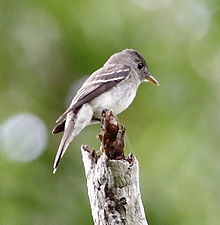Fluvicolinae
| Fluvicolinae | |
|---|---|

| |
| Fluvicola nengeta | |
| Scientific classification | |
| Domain: | Eukaryota |
| Kingdom: | Animalia |
| Phylum: | Chordata |
| Class: | Aves |
| Order: | Passeriformes |
| Family: | Tyrannidae |
| Subfamily: | Fluvicolinae Swainson, 1831[1] |
Fluvicolinae is a subfamily of passerine birds in the tyrant flycatcher family Tyrannidae, encompassing species widely distributed across the Americas. The subfamily includes 130 species that are divided into five tribes and 39 genera.
Taxonomy
Broad studies in molecular genetics performed by Tello et al. (2009) discovered a large number of new relationships within the family Tyrannidae that were not reflected in the majority of species classified as part of the family.[2] Following these studies, Ohlson et al. (2013) proposed a reorganization and division of the family Tyrannidae, which according to the proposal would divide the family into the subfamilies Fluvicolinae, Hirundineinae Tello, Moyle, Marchese & Cracraft, 2009, Muscigrallinae Ohlson, Irestedt, Ericson & Fjeldså, 2013, Tyranninae Vigors, 1825 and Elaeniinae, Cabanis & Heine, 1859–60.[3]
The cladogram below is based on a large molecular phylogentic study of the suboscines by Michael Harvey and collaborators that was published in 2020.[4] The taxonomy follows the list of world birds maintained by Frank Gill, Pamela C. Rasmussen and David Donsker on behalf of the International Ornithological Committee (IOC).[5] The tribes are those proposed by Jan Ohlson and collaborators in 2020 other than the genus Muscigralla that is placed in the tribe Muscigrallini rather than a separate subfamily Muscigrallinae.[6]
| Fluvicolinae |
| ||||||||||||||||||||||||||||||||||||||||||||||||||||||||||||||||||||||||||||||||||||||||||||||||||||||||||||||||||||||||||||||||||||||||||||||||||||||||||||||||||||||||||||||||||||||||||
Tribes and genera
The subfamily is grouped into the following 5 tribes and 39 genera:[3][6][5]
- Muscigrallini Ohlson, Irestedt, Ericson & Fjeldså, 2013[3]
- Muscigralla – short-tailed field tyrant
- Ochthoecini Ohlson, Irestedt, Batalha Filho, Ericson & Fjeldså, 2020[6]
- Myiophobus – flycatchers (8 species)
- Silvicultrix – chat-tyrants (5 species)
- Colorhamphus – patagonian tyrant
- Tumbezia – Tumbes tyrant
- Ochthoeca – chat-tyrants (9 species)
- Fluvicolini Swainson, 1831[1]
- Phelpsia – white-bearded flycatcher
- Guyramemua – Chapada flycatcher
- Sublegatus – scrub flycatchers (3 species)
- Colonia – long-tailed tyrant
- Arundinicola – white-headed marsh tyrant
- Fluvicola – water tyrants (3 species)
- Pyrocephalus – flycatchers (4 species)
- Muscipipra – shear-tailed grey tyrant
- Gubernetes – streamer-tailed tyrant
- Heteroxolmis – black-and-white monjita
- Alectrurus – tailed tyrants (2 species)

- Xolmiini Tello, Moyle, Marchese & Cracraft, 2009[2]
- Muscisaxicola – ground tyrants (12 species)
- Satrapa – yellow-browed tyrant
- Syrtidicola – little ground tyrant
- Lessonia – negritos (2 species)
- Hymenops – spectacled tyrant
- Knipolegus – black tyrants (12 species)
- Cnemarchus – bush tyrants (2 species)
- Xolmis – monjitas (2 species)
- Pyrope – fire-eyed diucon
- Nengetus – grey monjita
- Neoxolmis – monjitas (4 species)
- Myiotheretes – bush tyrants (4 species)

- Contopini Fitzpatrick, 2004[7]
- Ochthornis – drab water tyrant
- Cnemotriccus – fuscous flycatcher
- Aphanotriccus – flycatchers (2 species)
- Lathrotriccus – flycatchers (2 species)
- Xenotriccus – flycatchers (2 species)
- Sayornis – phoebes (3 species)
- Empidonax – flycatchers (14 species)
- Mitrephanes – tufted flycatchers (2 species)
- Contopus – pewees + flycatcher (16 species)
References
- ^ a b Swainson, William John (1831). Zoological illustrations, or, Original figures and descriptions of new, rare, or interesting animals. Series 2. Vol. 2. London: Baldwin, Cradock. Plate 46 text.
- ^ a b Tello, Jose G.; Moyle, Robert G.; Marchese, Daniel J.; Cracraft, Joel (2009). "Phylogeny and phylogenetic classification of the tyrant flycatchers, cotingas, manakins, and their allies (Aves: Tyrannides)". Cladistics. 25 (5): 429–467. doi:10.1111/j.1096-0031.2009.00254.x. PMID 34879622.
- ^ a b c Ohlson, Jan I.; Irestedt, Martin; Ericson, Per G. P.; Fjeldså, Jon (2013). "Phylogeny and classification of the New World suboscines (Aves, Passeriformes)". Zootaxa. 3613 (1): 1–35. doi:10.11646/zootaxa.3613.1.1. PMID 24698900.
- ^ Harvey, M.G.; et al. (2020). "The evolution of a tropical biodiversity hotspot". Science. 370 (6522): 1343–1348. Bibcode:2020Sci...370.1343H. doi:10.1126/science.aaz6970. PMID 33303617. A high resolution version of the phylogenetic tree in Figure 1 is available from the first author's website here.
- ^ a b Gill, Frank; Donsker, David; Rasmussen, Pamela, eds. (December 2023). "Tyrant flycatchers". IOC World Bird List Version 14.1. International Ornithologists' Union. Retrieved 12 April 2024.
- ^ a b c Ohlson, J.I.; Irestedt, M.; Batalha Filho, H.; Ericson, P.G.P.; Fjeldså, J. (2020). "A revised classification of the fluvicoline tyrant flycatchers (Passeriformes, Tyrannidae, Fluvicolinae)". Zootaxa. 4747 (1): 167–176. doi:10.11646/zootaxa.4747.1.7. PMID 32230123.
- ^ Fitzpatrick, J.W. (2004). "Description of a new tribe of Fluvicoline tyrant-flycatchers". In del Hoyo, J.; Elliott, A.; Christie, D.A. (eds.). Handbook of the Birds of the World. Vol. 9: Cotingas to Pipits and Wagtails. Barcelona, Spain: Lynx Edicions. pp. 25–27. ISBN 978-84-87334-69-6.
